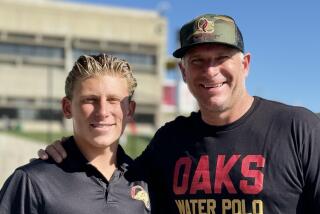Loyola Marymount student-athletes are making the grade
The NCAA and its member institutions often refer to “student-athletes,” but the front side of the term isn’t often highlighted in a sports section. We asked officials from the Southland’s Division I universities to point us toward their best and brightest — the teams that made classroom performance a priority.
Here is what we found at Loyola Marymount:
The Seaver School of Science and Engineering at Loyola Marymount is not for the faint of academic heart.
But it’s where a fair share of Loyola Marymount athletes — 27 of 395 to be exact — focus their studies. And where three in particular have shined.
Kiara Cerda of women’s water polo, Kevin Joerger of men’s cross-country and Quin Thames of men’s rowing will be graduating near the top of their class this spring, each just a few percentage points shy of a perfect 4.0 grade-point average.
Cerda is a biology major with a 3.96 GPA; Joerger, a chemistry major with a 3.94; and Thames, whose focus is computer science, has a 3.92.
In 2012, Cerda received the NCAA Elite 89 award, the highest academic award given to a college athlete. She had the highest GPA of any player participating at that year’s NCAA women’s water polo championships.
Academic achievement, especially in such daunting fields of study, is second nature to the LMU trio.
“It can be hard, especially with practice in the morning because you have to wake up really early and if you’re stuck studying for a test really late you don’t get much sleep,” Thames said. “But it’s still manageable.”
The push for academic success comes from the top of the athletic program. Cerda said she lives by the words of Matt Casana, LMU’s assistant athletics director for student services.
“He likes to say the jersey never comes off,” Cerda said. “So for him and for our department in general, they want us to be an example not just in the pool, athletically, but also in the classroom.”
Some LMU teams provide mentorship programs in which an older team member helps an underclassman adjust to college life. The school also provides tutoring opportunities for any student-athlete who requests or is in need of extra help.
“They really stay on top of us to make sure we’re not giving student-athletes a bad name,” said Cerda, who picked up a minor in Spanish to help with her career aspirations of being a doctor in underserved communities.
Thames said success in the classroom comes from an approach that has served him well as an athlete.
“It really forces you to have better time-management skills,” he said. “If you’re able to put a certain amount of dedication to the sport to be at that level, then you can also apply that to your work.”
More to Read
Go beyond the scoreboard
Get the latest on L.A.'s teams in the daily Sports Report newsletter.
You may occasionally receive promotional content from the Los Angeles Times.











